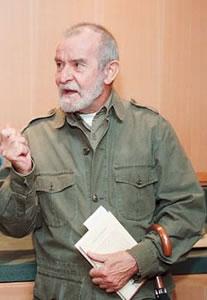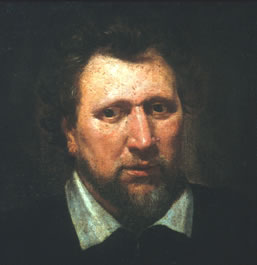De Amerikaanse schrijver William Styron werd op 11 juni 1925 in Newport News in de staat Virginia geboren. Zie ook mijn blogs van 11 juni 2006, van 4 november 2006. en mijn blog van 11 juni 2007.
Uit: The Paris Review, interview (1954)
INTERVIEWER
Does your emotional state have any bearing on your work?
STYRON
I guess like everybody I’m emotionally fouled up most of the
time, but I find I do better when I’m relatively placid. It’s hard to
say, though. If writers had to wait until their precious psyches were
completely serene there wouldn’t be much writing done.
Actually—though I don’t take advantage of the fact as much as
I should—I find that I’m simply the happiest, the placidest, when
I’m writing, and so I suppose that that, for me, is the final answer.
When I’m writing I find it’s the only time that I feel completely
self-possessed, even when the writing itself is not going too well.
It’s fine therapy for people who are perpetually scared of nameless
threats as I am most of the time—for jittery people. Besides, I’ve
discovered that when I’m not writing I’m prone to developing
certain nervous tics, and hypochondria. Writing alleviates those
quite a bit. I think I resist change more than most people. I dislike
traveling, like to stay settled. When I first came to Paris all I could
think about was going home, home to the old James River. One of
these days I expect to inherit a peanut farm. Go back home and
farm them old peanuts and be real old Southern whiskey gentry.
INTERVIEWER
Your novel was linked to the Southern school of fiction.
Do you think the critics were justified in doing this?
STYRON
No, frankly, I don’t consider myself in the Southern school,
whatever that is. Lie Down in Darkness, or most of it, was set in
the South, but I don’t care if I never write about the South again,
really. Only certain things in the book are particularly Southern.
I used leitmotifs—the negroes, for example—that run throughout
the book, but I would like to believe that my people would have
behaved the way they did anywhere. The girl, Peyton, for instance,
didn’t have to come from Virginia. She would have wound up
jumping from a window no matter where she came from. Critics
are always linking writers to “schools.” If they couldn’t link
people to schools, they’d die. When what they condescendingly
call “a genuinely fresh talent” arrives on the scene, the critics
rarely try to point out what makes him fresh or genuine but
concentrate instead on how he behaves in accordance with their
preconceived notion of what school he belongs to.

William Styron (11 juni 1925 – 1 november 2006)
Foto uit 1952
De Britse dichteres en schrijfster Renée Vivien (eig. Pauline Mary Tarn) werd geboren op 11 juni 1877 in Londen. Zie ook mijn blog van 11 juni 2007
Roses Rising
My brunette with the golden eyes, your ivory body, your amber
Has left bright reflections in the room
Above the garden.
The clear midnight sky, under my closed lids,
Still shines….I am drunk from so many roses
Redder than wine.
Leaving their
garden, the roses have followed me….
I drink their brief breath, I breathe their life.
All of them are here.
It’s a miracle….The stars have risen,
Hastily, across the wide windows
Where the melted gold pours.
Now, among the roses and the stars,
You, here in my room, loosening your robe,
And your nakedness glistens
Your unspeakable gaze rests on my eyes….
Without stars and without flowers, I dream the impossible
In the cold night.
Undine
Your laughter is light, your caress deep,
Your cold kisses love the harm they do;
Your eyes-blue lotus waves
And the water lilies are less pure than your face..
You flee, a fluid parting,
Your hair falls in gentle tangles;
Your voice-a treacherous tide;
Your arms-supple reeds.
Long river reeds, their embrace
Enlaces, chokes, strangles savagely,
Deep in the waves, an agony
Extinguished in a night drift.
Vertaald door Margaret Porter and Catherine Kroger

Renée Vivien (11 juni 1877 – 10 november 1909)
Beeld door Auguste Rodin
De Zuidafrikaanse schrijver Harold Athol Lannigan Fugard werd geboren op 11 juni 1932 in Middelburg, Kaapprovincie. Zie ook mijn blog van 11 juni 2007.
Uit: Encounters with Fugard: native of the Karoo (artikel in ‘Twentieth Century Literature’ door Mary Benson)
„His sense of rootedness became a recurring theme. “I know that I have mastered the code of one time, one place,” he confided in another letter. “My life’s work is possibly to witness as truthfully as I can the nameless and destitute of this one little corner of the world.” And so he wrote about Johnnie and Hester Smit living in a back street of Port Elizabeth and in the first production of Hello and Goodbye, directed by Barney Simon at the Library Theatre in Johannesburg, gave a poignant and wonderfully comic performance as Johnnie. Next he created Boesman and Lena, the “coloured” couple scratching for bait in the mudflats, and embraced them “so fiercely and lovingly,” as Stanley Kauffmann wrote in The New Republic, “that in their rags and drunkenness and cunning and persistence they move through a small epic of contemporary man” .
Deprived of his passport for four years by the South African government, Fugard was not free until 1971 to journey to London for a production of Boesman and Lena. He arrived exhausted after touring the play in South Africa. Paul Klee’s Pedagogical Sketchbook stimulated him with its theme of the flight of an arrow and the question, “How do I expand my reach?” (Klee 54). Here is restriction, thither is there and liberation, Klee was saying. The consolation, then, is to go a bit farther than customary. “Yes!” Athol exclaimed, when I gave him Klee’s book and he glanced through it, “I must extend my reach with this new production!”

Athol Fugard (Middelburg (ZA), 11 juni 1932)
De Engelse dichter en schrijver Ben Jonson werd geboren rond 11 juni 1572 in Westminster, Londen. Zie ook mijn blog van 11 juni 2006 en ook mijn blog van 11 juni 2007
To John Donne
DONNE, the delight of Phoebus, and each Muse,
Who, to thy one, all other braines refuse ;
Whose every work, of thy most early wit,
Came forth example, and remaines so, yet ;
Longer a knowing, than most wits do live ;
And which no affection praise enough can give !
To it, thy language, letters, arts, best life,
Which might with halfe mankinde maintaine a strife ;
All which I meant to praise, and, yet, I would ;
But leave, because I cannot as I should !
WHY I WRITE NOT OF LOVE
SOME act of LOVE’S bound to rehearse,
I thought to bind him in my verse :
Which when he felt, Away, quoth he,
Can poets hope to fetter me ?
It is enough, they once did get
Mars and my mother, in their net :
I wear not these my wings in vain.
With which he fled me ; and again,
Into my rhymes could ne’er be got
By any art : then wonder not,
That since, my numbers are so cold,
When Love is fled, and I grow cold.
OF LIFE AND DEATH
The ports of death are sins ; of life, good deeds ;
Through which our merit leads us to our meeds.
How wilful blind is he, then, that would stray,
And hath it, in his powers, to make his way !
This world death’s region is, the other life’s ;
And here, it should be one of our first strifes,
So to front death, as men might judge us past it :
For good men but see death, the wicked taste it.

Ben Jonson (ca. 11 juni 1572 – 6 augustus 1637)
Zie voor onderstaande schrijver ook mijn blog van 11 juni 2007
De Japanse schrijver Yasunari Kawabata werd geboren op 11 juni 1899 in Osaka.
De Engelse dichter en satiricus George Wither werd geboren op 11 juni 1588 in Bentworth.
